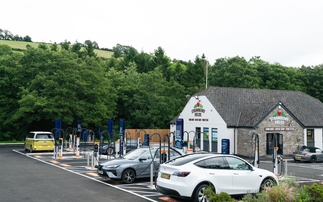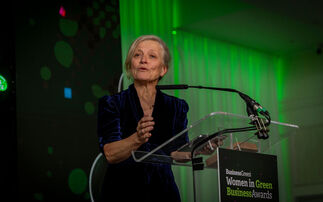
Georgie Bray, a third-generation farm manager at Hope Farm in Cambridgeshire | Credit: ADM
Partner Insight: On the rolling hills of the Iford Estate in East Sussex, a quiet transformation is taking place. Farmer Ben Taylor has been stewarding this land for 27 years, and for more than half that time has been rethinking how food is grown, soil is nurtured, and farms are future-proofed
"We've been farming regeneratively for 15 years at Iford," says Taylor. "It started off as cost-reduction — stopping ploughing seemed cheaper. But as we learnt more from others, the environmental benefits became clear."
Taylor's journey mirrors a growing movement across the UK, where farmers are embracing regenerative agriculture — an outcome-focused approach that aims to restore natural ecosystems while improving farm profitability. It centres on practices like reduced tillage, cover cropping, and efficient input management. More than a checklist, regenerative agriculture is grounded in trialling, adaptability, and long-term resilience.
At the heart of this shift is collaboration — between farmers, industry partners, and agriculture players like ADM. As a global agricultural supply chain manager and processor, ADM plays a significant role in sourcing and processing crops for food, beverages and animal feed.
Through its regenerative agriculture programme, ADM offers both technical support and financial incentives to farmers in the UK and globally to help them adopt regenerative practices that suit their soil conditions and business.
A new era of partnership
For Georgie Bray, a third-generation farm manager at Hope Farm in Cambridgeshire, collaboration is a necessity in today's landscape. "Collaboration has always been fundamental in farming," explains Bray. But with tighter budgets, and the need to run farm businesses sustainably, that challenge is greater than ever.
She believes a joined-up approach between farmers and industry stakeholders is vital to delivering healthy, sustainable food systems while keeping farming businesses viable. Her partnership with ADM has helped bridge that gap, offering the confidence to trial new practices with the reassurance of expert support.
Taylor agrees that partnerships are key to unlocking regenerative potential. "The knowledge barriers and the capital investment required are significant," he says. "But a partnership with a purchaser that recognises the financial benefits gives everyone the confidence to take that step."
Risk, reward and resilience
One of the most important aspects of ADM's programme is its emphasis on incentivising farmers to take the leap to regenerative practices to reap mutual benefit — offering financial incentives as well as technical support.
Bray has used this support to refine her approach. "It's enabled us to better integrate our regenerative approaches and feel that they are rewarded by mainstream industry," she says. "We've looked at nitrogen use, yield vs. inputs, and our carbon emissions relative to production. That kind of insight is invaluable."
She also stresses the importance of financial viability. "The offer of programmes like this gives us reassurance that big companies are looking at carbon emissions and how they can support farmers — with rewards. Farmers want to be supported to farm sustainably, but it must make business sense in a volatile market."
Further west at Ritherdens Farm, Somerset, arable farmer Peter Venn has also seen the benefits of working with ADM. As his cropping rotation evolved, ADM's expertise helped guide decisions on which crops to grow and how to market them. While liquid fertiliser isn't right for every farm, one of the most impactful changes he made to his own farm was to switch from granular to liquid nitrogen fertiliser — prompted by conversations with his ADM farm trader and backed by wider research on benefits to soil health.
"The move from granular to liquid nitrogen fertiliser has been made with the aid of advice from ADM," Venn explains. "Following some research and discussion with others around the area and country we chose to move to liquid fertiliser…This has enabled us to improve our nutrient stewardship on farm and increase yields."
Building stronger relationships
For Venn, what sets ADM apart as a partner is the strength and consistency of the relationships it builds with growers. "The strong relationships built by the farm trading team are supported by the rest of the ADM team whether they regularly engage with farmers or not," he says. "Whether it is Sam (our farm trader) calling with an update on the markets or an opportunity to consider, through to Garry or Jason from ADM's logistics team calling to organise transport — everything is aimed at getting it right."
That sense of being listened to, rather than instructed, is an important departure from more traditional business relationships. It's a model that fosters experimentation with new practices and mutual benefit in the supply chain — critical ingredients not just for supply chain relationship success, but for building a more resilient food system.
This is also reflected in Taylor's experience. "The exchange of market information and practical advice allows us to better understand what's needed and wanted" he says. "The benefits flow both ways. We get a bit more money for our crops, and ADM gets the product and quality they're looking for."
Knowledge sharing and community
Beyond financial incentives, ADM's regenerative agriculture programme creates space for farmers to learn from one another. Online meetings and data-sharing sessions have helped Bray connect with other growers and benchmark her progress.
"It's been very interesting to see where other ADM growers sit," says Bray. "As these contracts become more normal, we need to make best use of the advice available."
Taylor adds: "The more knowledge that is shared and disseminated, the better. Collaborative working across the industry is vital."
Looking ahead
As the UK faces mounting environmental and economic pressures, regenerative agriculture offers a pathway to resilience. But it's not a journey farmers can take alone. "The recognition that these techniques are valuable, and that they have a market attached to them, is the only way to get widespread adoption," says Taylor.
Bray adds: "We need to ensure that farmers are supported—financially, with technical advice, and with the ability to plan ahead. These are businesses that need time to initiate change."
At Iford, Hope Farm, and Ritherdens Farm, change is already underway. But the transition to regenerative agriculture requires more than individual effort. It demands collaboration - between farmers, industry, and technical experts. And as more farmers look to the future, it's clear that supportive partnerships will be the key to cultivating a more secure, sustainable food system.
This article is sponsored by ADM.






